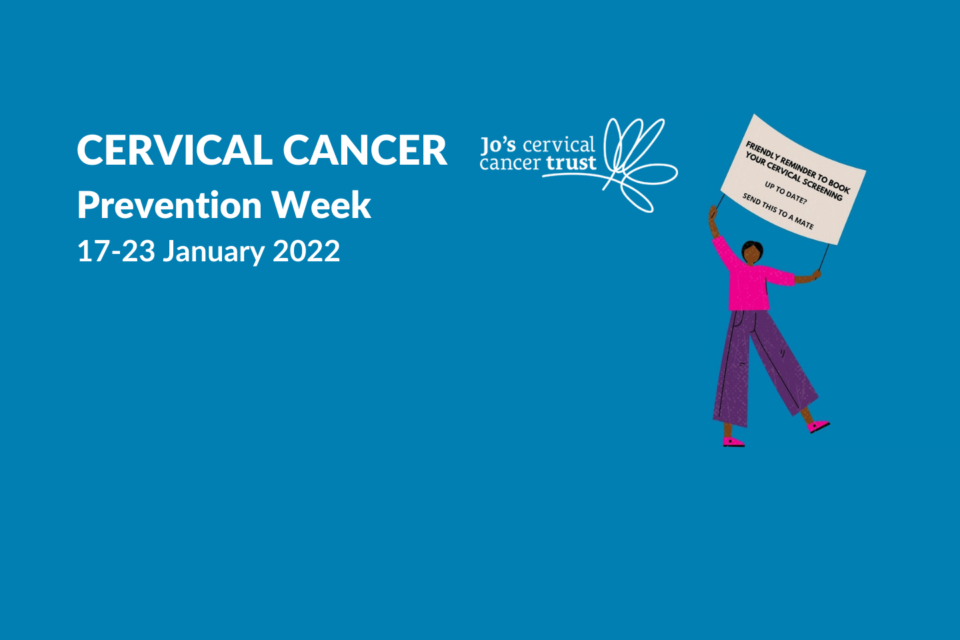In this blog Hannah Wright, Policy & Public Affairs Assistant at Jo’s Cervical Cancer trust encourages midwives to support in cervical cancer prevention
January 17th – 23rd marks Cervical Cancer Prevention Week, a week dedicated to raising awareness of HPV vaccination, cervical screening, and treatment for cervical cell changes.
This year it’s more important than ever, as the latest cervical screening coverage stats from across the UK show a significant fall in the number attending. Did you know almost 1 in 3 women and people with a cervix do not attend cervical screening when invited? By detecting HPV infection and any cell changes at an early stage we can stop cervical cancer before it starts, but many people find it difficult to attend.
For some the test is embarrassing or uncomfortable, for others it is painful, and for those with a physical disability, experience of trauma, or gender dysphoria there are even more barriers. Gaps in understanding about the relevance of the test, or what it is for, also impact attendance.
At Jo’s Cervical Cancer Trust we are using Cervical Cancer Prevention Week to highlight the importance of cervical screening in preventing cervical cancer, as well as signposting people to the information, resources, and support we provide. We’re focusing in particular on results and making sure no-one has to face them alone.
Midwives play an important role in supporting the cervical screening programme. It is usually recommended not to have cervical screening during pregnancy, although in some cases a colposcopy may be needed. Being able to answer the questions of those in your care, in addition to reminding those overdue screening to book from 3 months after their baby is born is really important.
We’re also taking the opportunity this week to highlight that cancer prevention doesn’t stop at cervical screening. What comes next is just as important: the results.
Every year, 220,000 women and people with a cervix are told they have cervical cell changes after their screening, and many more are given HPV diagnosis. Cell changes are not cancerous but may require monitoring or treatment at colposcopy to ensure they do not develop into cancer.
We surveyed over 1,000 people with experience of cell changes and found that almost all felt scared and upset following their diagnosis, with many reporting feeling alone and isolated. 40% felt confused, which reflects what we hear through our Helpline and support services, where 50% of calls we receive involve questions around HPV.
Fears around fertility and pregnancy following a cell changes diagnosis were notably high, and these continued through and beyond treatment. 43% of 25-29 year olds identified fertility as one of their biggest concerns while diagnosed.
“I really want children later in life, I didn’t realise how much until this experience. I’m worried about miscarrying my children when I do become pregnant, and I don’t know if I am strong enough to handle that mentally. I am also worried about having a premature child.”
The risk of treatment given at colposcopy increasing risk of preterm birth is low, as most LLETZ procedures, the most common treatment, remove less than 10mm of the cervix (the point at which risk increases). Ablative treatments do not significantly increase risk. For anyone who is considered higher risk there are interventions including a cervical stitch or progesterone treatment.
Despite most treatments having very little risk of causing preterm births, patients feel disproportionately anxious. There is a great opportunity here for midwives to give reassurance and support.
“During my first pregnancy I was particularly nervous about miscarrying (especially as they were IVF pregnancies) because my cervix wouldn’t be strong enough to support the baby. Even when I asked about it no one checked me, it felt like it wasn’t taken seriously. It may not have been an issue, but it would have been nice to be reassured by a healthcare professional.”
During their first antenatal appointment the patient should be asked about “her medical history, obstetric history and family history”, and this should include a discussion around any treatment for cervical cell changes. We know that women don’t always remember or understand everything about their diagnosis and treatments, so midwives have a key role to play in starting the conversations.
Feeling like their concerns are being taken seriously and being reassured about the facts around treatment for cell changes, can do a lot to help ease anxiety. There is often no cause for concern, and this is a great opportunity to reassure women about the safety and effectiveness of their treatment.
“I raised it with my midwife during my second pregnancy as I knew there was a slight risk of premature labour due to the shorter length of my cervix after the treatment. She made sure to raise this with the obstetric team and seek advice. They confirmed I was still able to proceed with a planned home birth. I felt supported.”
Conversations around HPV in particular can be challenging. Being prepared for questions around the virus can help provide support and reassurance. By ensuring patients feel supported at every step of their cancer prevention journey – from screening, through treatment, and beyond – we can help make sure women and people with a cervix continue to engage with the cervical screening programme.
Hannah Wright,
Policy & Public Affairs Assistant,
Jo’s Cervical Cancer Trust
To find out more about patient experiences of cell changes and colposcopy, check out the latest report from Jo’s Cervical Cancer Trust: https://www.jostrust.org.uk/about-us/our-research-and-policy-work/our-research/cell-changes-experiences
If you’d like to support Jo’s Cervical Cancer Trust this Cervical Cancer Prevention Week, visit our campaign page to find out more information, and resources you can share with colleagues, friends, and family! https://www.jostrust.org.uk/get-involved/campaign/cervical-cancer-prevention-week
Twitter – https://twitter.com/JoTrust
Facebook – https://www.facebook.com/joscervicalcancertrust/
Instagram – https://www.instagram.com/joscervicalcancertrust



